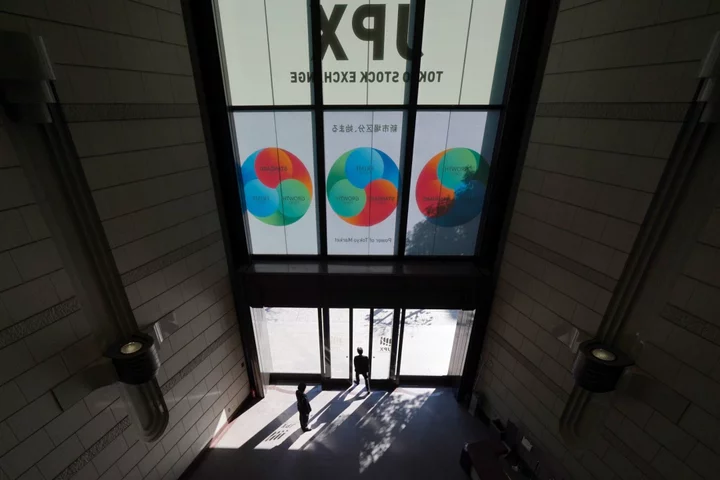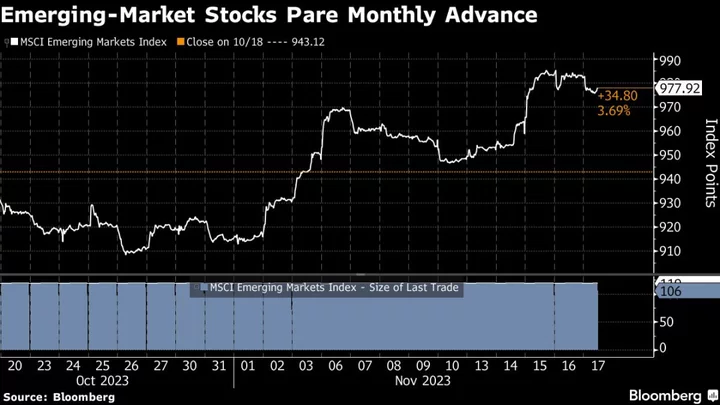Activist investors are poised to make record shareholder proposals in Japan this year, emboldened by a Tokyo bourse campaign to boost valuations, as the combined pressure on companies becomes one catalyst for a market that just hit a three-decade high.
The number of proposals submitted for this year’s shareholder meetings has jumped about 60% from the same time last year, according to data from consultancy IR Japan Holdings Ltd. It’s already reached 75% of last year’s all-time high of 58 proposals.
Investors including Aya Murakami, the daughter of famous local shareholder activist Yoshiaki Murakami, and Oasis Management Co.’s Seth Fischer say the Tokyo Stock Exchange’s latest campaign to get executives to improve long-depressed valuations is serving as a tailwind for their own efforts. Bourse operator Japan Exchange Group Inc. announced in January that it will prod companies that trade below book value to disclose plans to boost their share price.
Japan is one of the world’s strongest major equity markets this year, with the benchmark Topix index hitting its highest since 1990 last week. Analysts also see many other factors for the outperformance, including ultra-easy monetary policy at a time when many countries are tightening, a weaker currency that helps the nation’s exporters, endorsement by big-name investors such as Warren Buffett and inflation finally starting to take hold after decades of falling prices.
The exchange’s move is “epoch-making,” Murakami said in an online interview from Singapore.
Surge in Proposals
While it’s not surprising that activist investors would cheer a campaign that aligns with their interests, the surge in proposals shows they see more opportunity in the market, and there have been some signs their efforts are bearing fruit.
Dai Nippon Printing Co., a 146-year-old firm that has long been seen as unfriendly to shareholders, announced a plan to buy back as much as 300 billion yen ($2.2 billion) in shares. The Tokyo-based company, which traded below book value, had become a target for billionaire Paul Singer’s Elliott Management Corp.
Hong Kong-based Oasis is calling on construction firm Kumagai Gumi Co. to buy back 20% of its shares and take other steps. Silchester International Investors is requesting a special dividend from Obayashi Corp., another builder. Dalton Investments Inc. has urged general contractor Toda Corp. to repurchase shares.
“There is an enormous amount of potential in Japan,” said Fischer, Oasis’s chief investment officer. “Shareholders are going to take a more active approach to assisting management, improving their businesses, return on equity and shareholder returns. This is what the TSE is talking about as well, in terms of trying to help companies improve their price-to-book ratios.”
Below Book Value
While activists see opportunity and say Japan is changing, there is much work to do. Some 47% of TSE-listed companies still trade with a price-to-book ratio of less than one, according to data compiled by Bloomberg. Japanese CEOs have come to see these low levels as a fact of life in a country with a shrinking population. And despite the Topix’s recent multidecade high, it still trades about 25% below its record in 1989.
Like activists, the exchange has an incentive to increase investor interest in Japanese equities. And like them, it wants to end the sense of resignation that pervades among some of Japan Inc.’s leaders.
Part of the challenge will be to get Japanese institutional investors onboard. Local institutions have long rubber-stamped management’s proposals at annual general meetings regardless of how they are performing. That’s starting to change, according to Oki Matsumoto, president of financial services firm Monex Group Inc. Institutions are now occasionally siding with proxy advisers such as Institutional Shareholder Services Inc. and Glass Lewis & Co., he said.
“CEOs of those companies now have a big fear that there will be a lot of votes against him,” Matsumoto said. “If they don’t do anything, they could be even fired. That is why I think many CEOs feel they have to act.”
Fujio Mitarai, longtime chairman of Canon Inc., almost got voted out at the camera-maker’s AGM in March, scraping by with a wafer-thin majority of 50.59%. It was a big shock in a country where approval ratings of more than 90% have been the norm.
For activists, the prize has always been access to Japan’s huge cash piles. Japanese companies collectively hold 321 trillion yen in cash, according to the Bank of Japan data, almost double the level in 2008 and equivalent to 58% of the country’s gross domestic product.
For companies, repurchasing stock is a quick way to increase the price-to-book ratio. Shares typically surge when repurchases are announced. And this gets activists and the exchange off their backs.
The bourse’s campaign isn’t legally binding, but peer pressure and shame can be powerful motivators in Japan. While the exchange doesn’t publish a list of companies that trade below book value, it’s easy to find out which ones do. And now, there’s a stigma attached to doing so.
Still, these shame tactics only go so far. The exchange launched a stock index nicknamed the shame gauge in 2014, also designed to get companies to boost returns and valuations. But almost a decade later, about half of firms listed in Japan still trade below book.
And with all the fanfare about the Topix reaching a 1990 high, even the activist Murakami sounds a note of caution.
“I feel markets have gotten a bit ahead of themselves,” she said. “The stock market and its valuation have risen quite a bit already.”
Buybacks announced so far this year, while still high, are slightly short of the record level seen last year, according to JPMorgan Chase & Co. and Okasan Securities Group Inc.
“But I do expect changes in the longer run,” Murakami said. “The latest earnings season saw some companies that have never talked about capital policy before coming up with plans to boost their PBR and so on. We may not see changes immediately but we can see signs of changes.”
Matsumoto of Monex says years of efforts to boost corporate governance, starting with former Prime Minister Shinzo Abe’s administration more than a decade ago, are finally yielding results. Under Abe, Japan established corporate governance and stewardship codes.
“It’s a bit like water finally starting to spill over from a glass,” he said.
Yuri Okina, chairperson of think tank Japan Research Institute warns the situation is more complicated than just using cash hoards to buy back shares. Ultimately, she says, companies must work out how to invest their resources for the future.
“What’s more important is to think about a path to sustainable growth,” she said.









